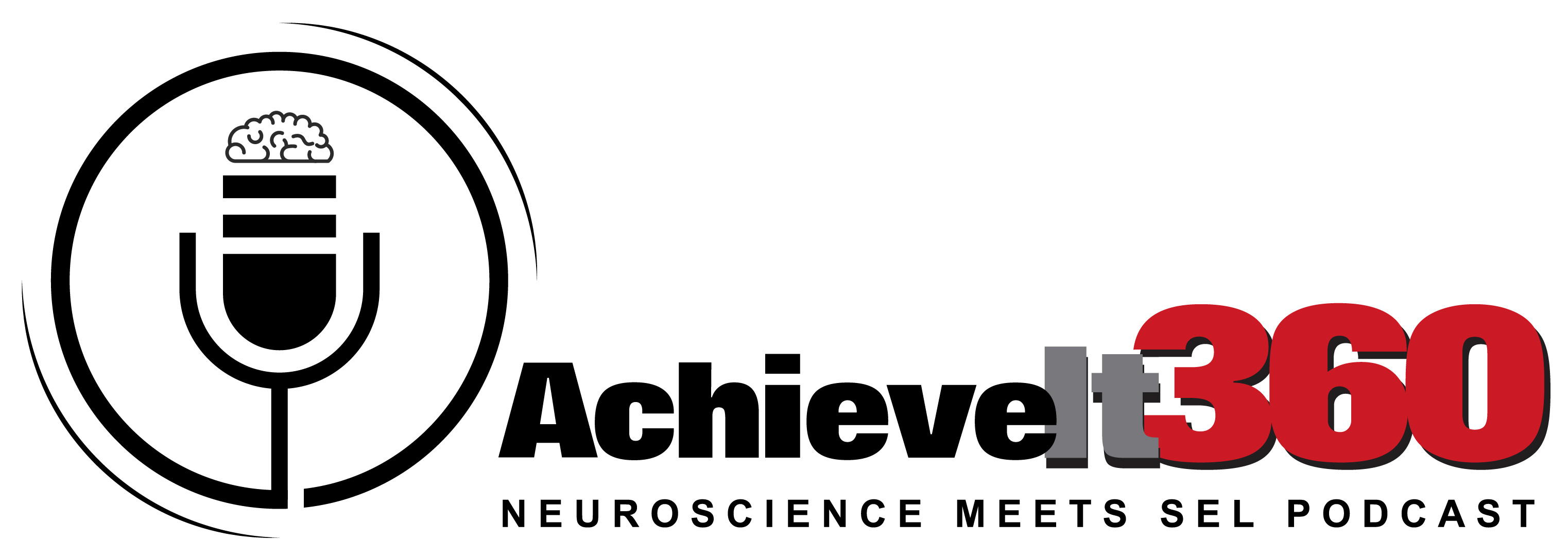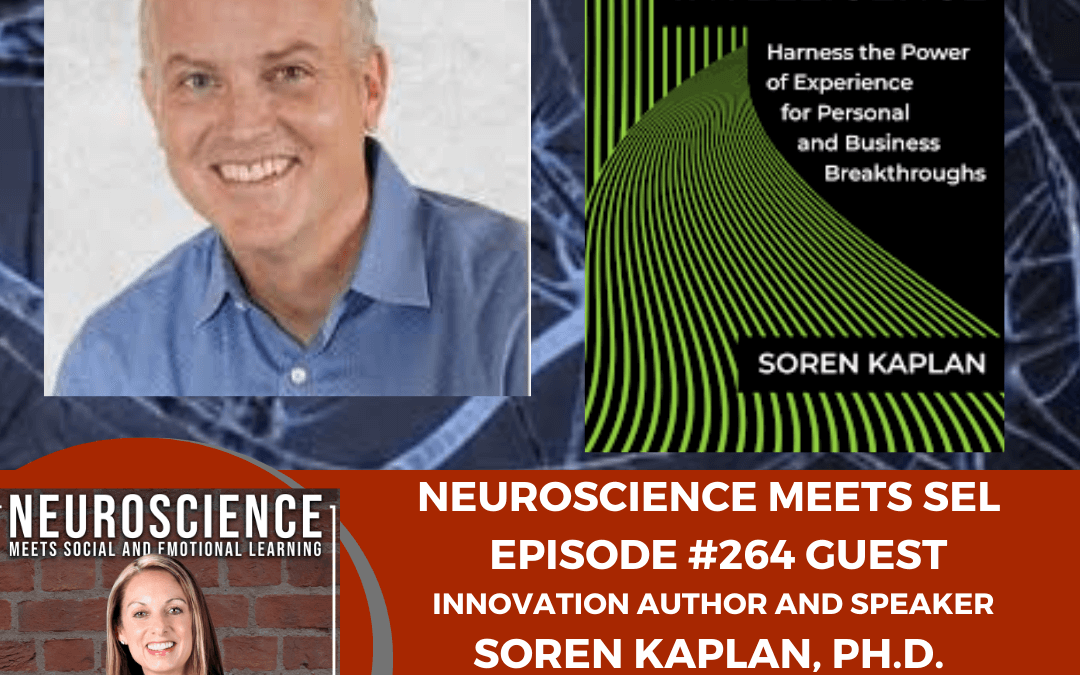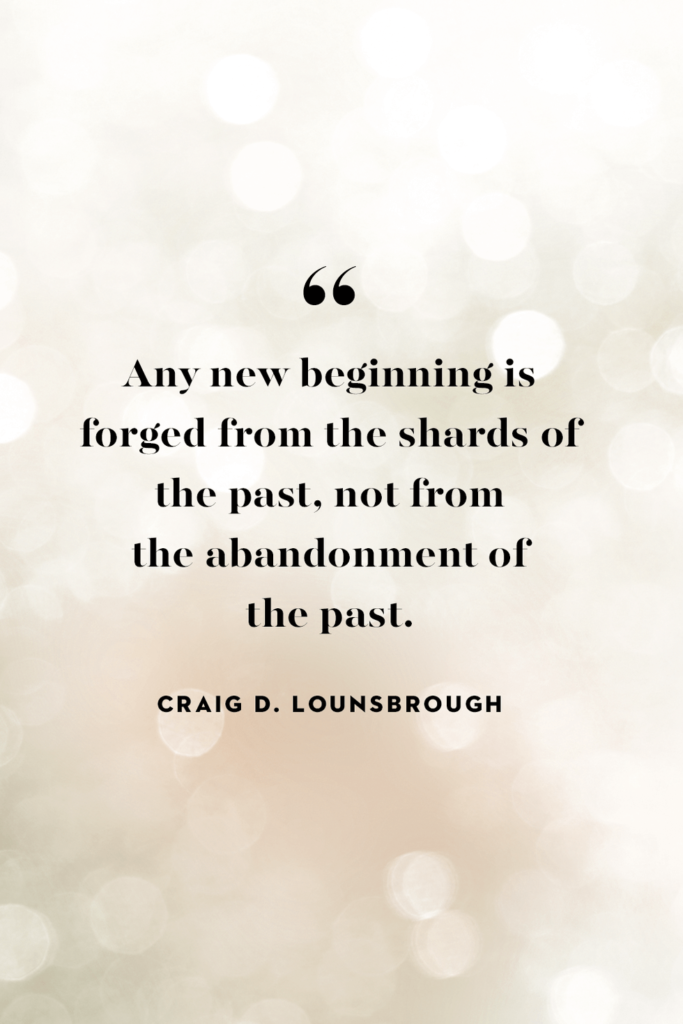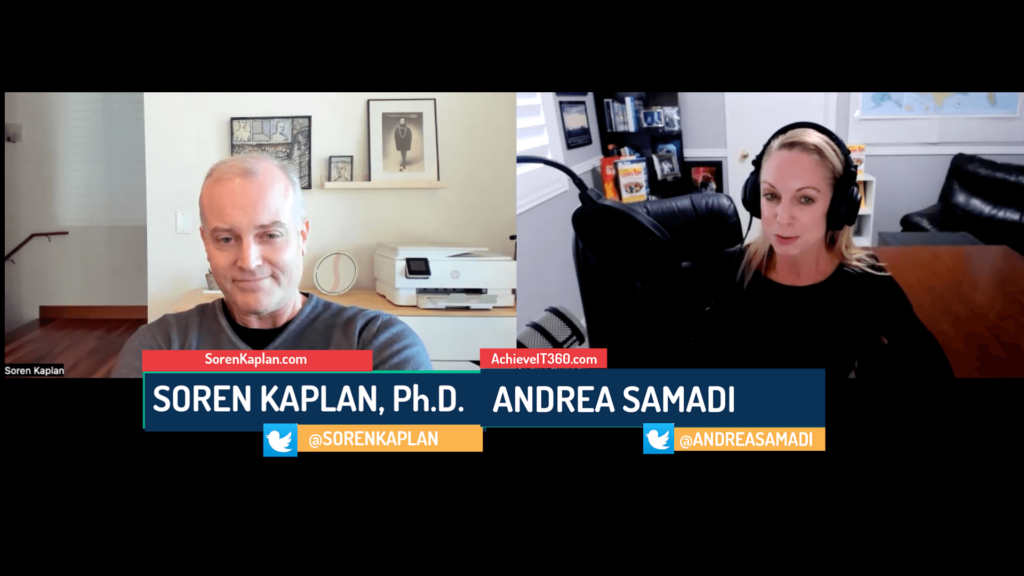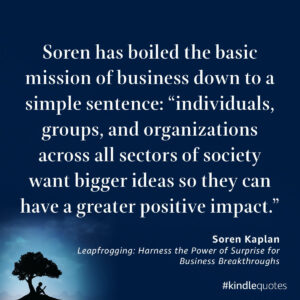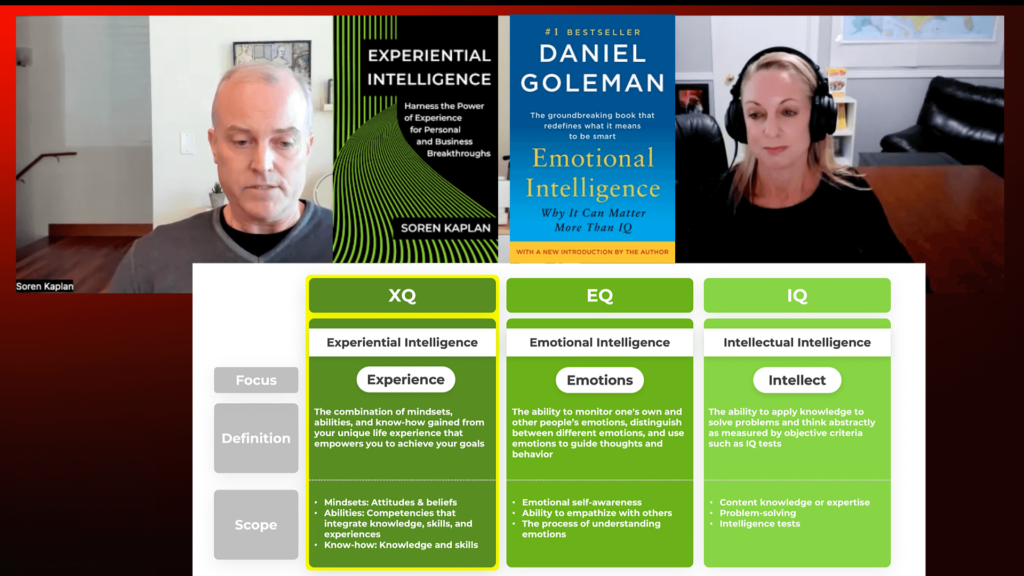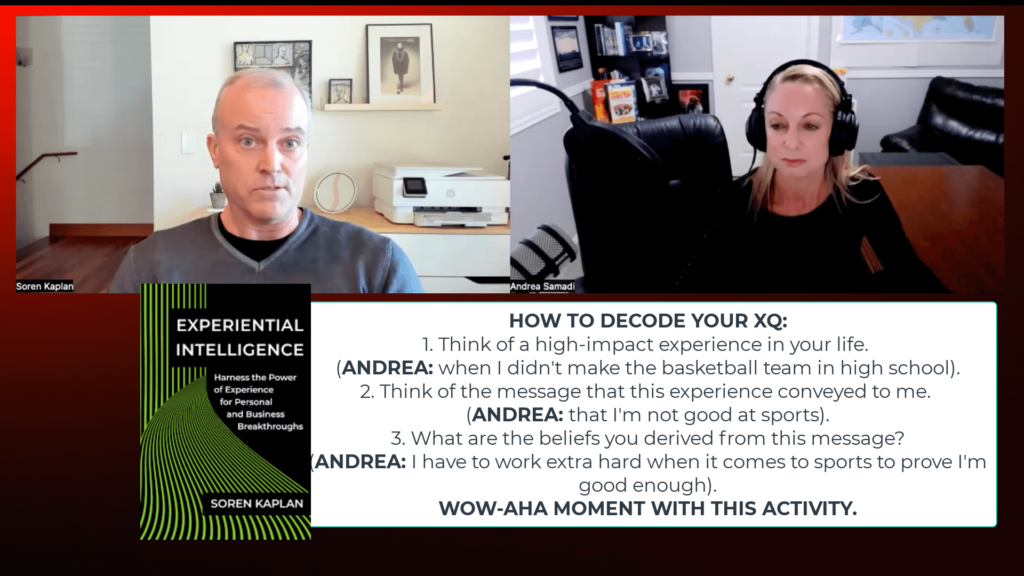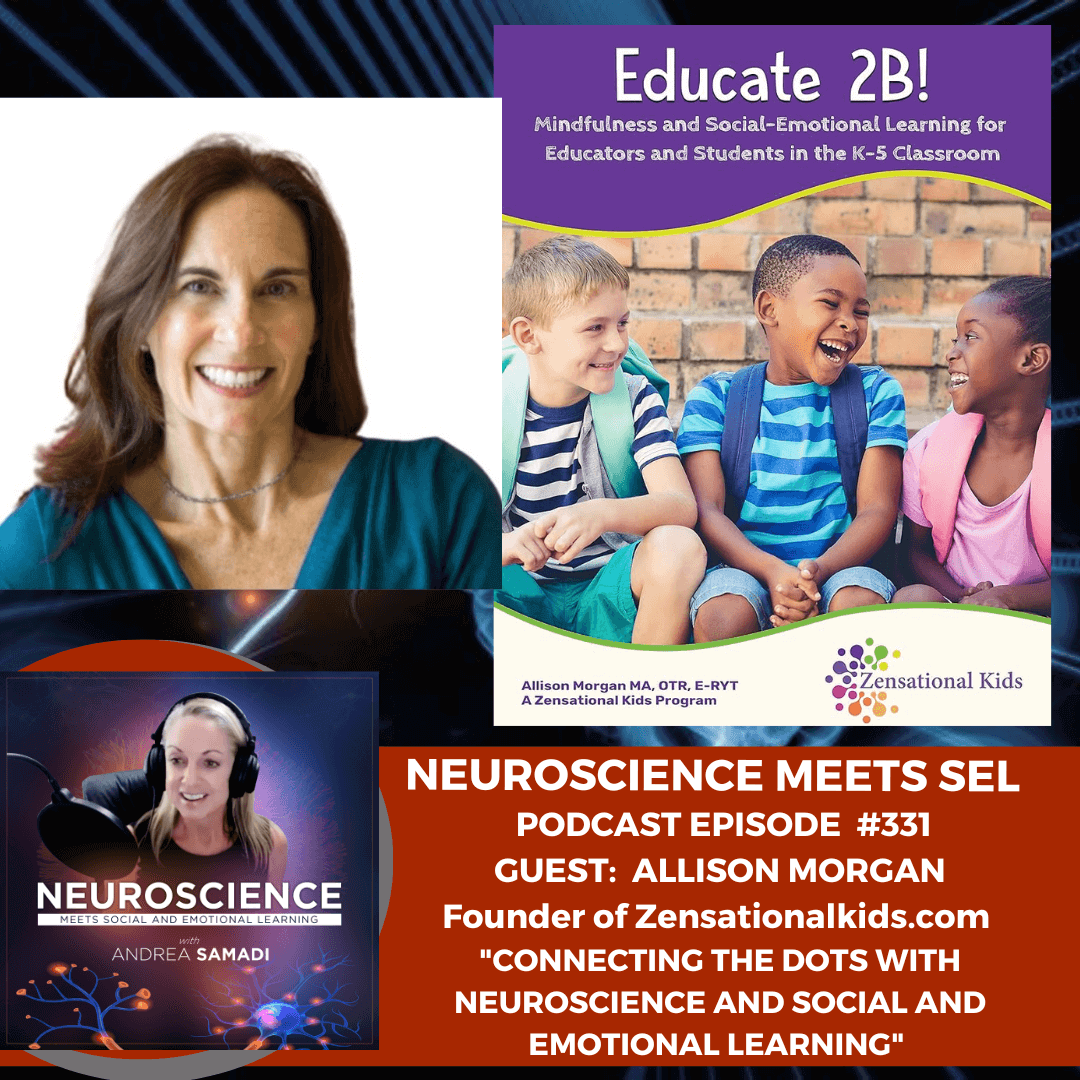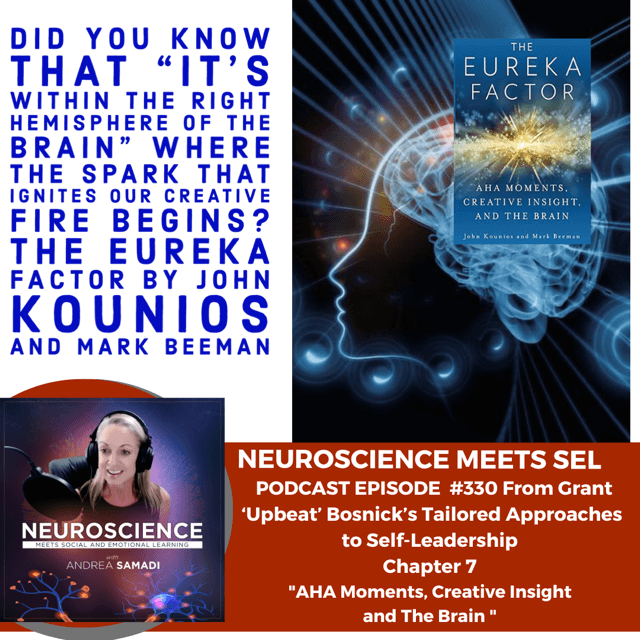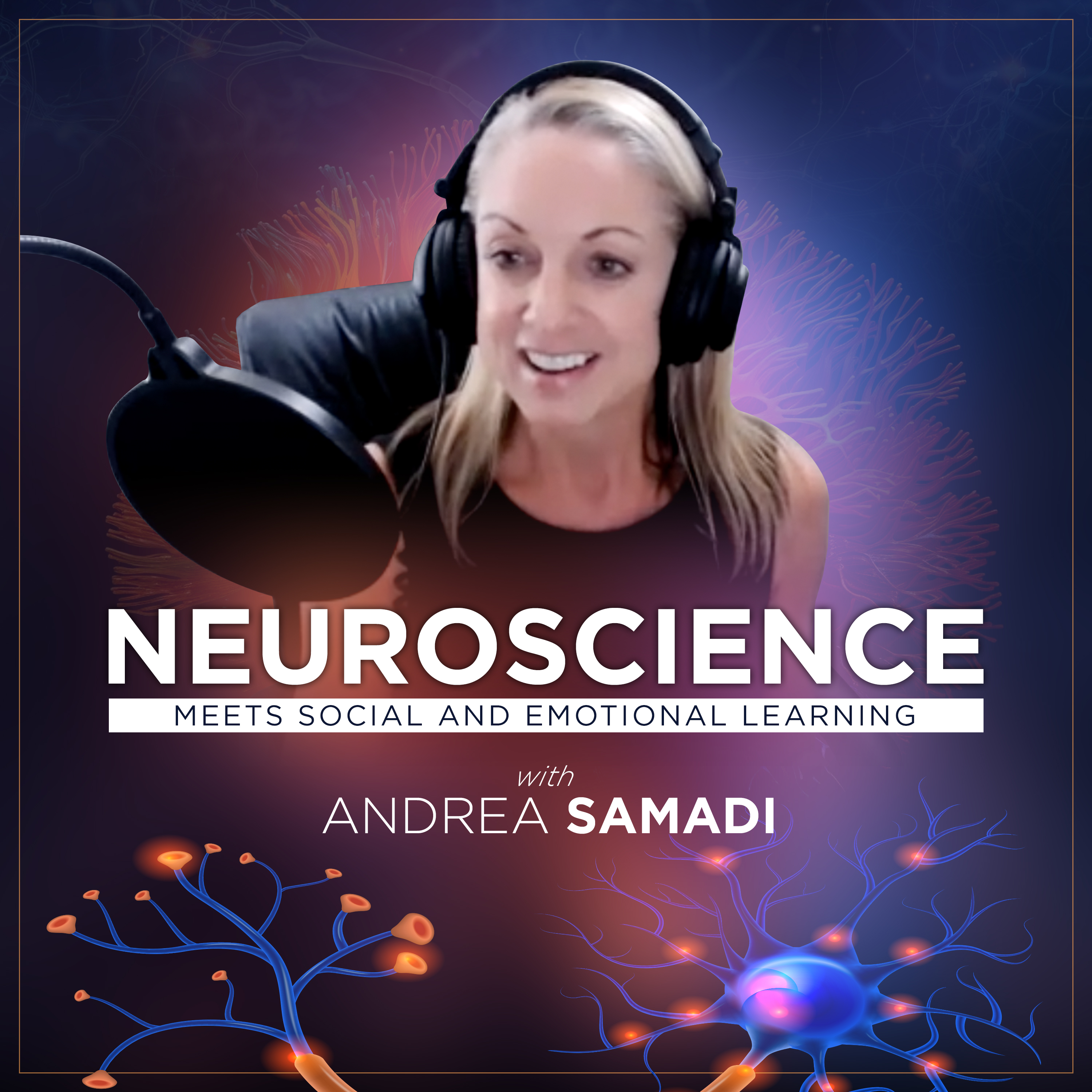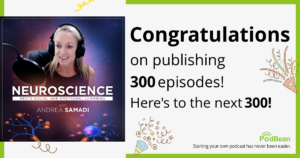“Any new beginning is forged from the shards of the past, not from the abandonment of the past.” Craig Lounsbrough
Watch this interview on YouTube here https://youtu.be/M45pacbfyqA
On this episode we will cover:
✔ Soren Kaplan’s background, and how he came became interested in helping high level businesses breakthrough to new heights.
✔ How he has met and worked with some of the world’s most well known experts in leadership and innovation.
✔ Where his innate strengths, talents and skills emerged from, skyrocketing his career and personal success.
✔ How we can ALL tap into the missing ingredient he discovered that leads to high levels of success and breakthroughs.
✔ How we can use this missing ingredient that he calls EXPERIENTIAL INTELLIGENCE (XQ) to become better leaders, increase collaboration, innovation and results at home or in the workplace.
✔ How EXPERIENTIAL INTELLIGENCE (XQ) compliments IQ and EQ.
✔ A simple formula for decoding our own EXPERIENTIAL INTELLIGENCE (XQ).
✔ How to use EXPERIENTIAL INTELLIGENCE (XQ) with teams, or individuals.
✔ The research behind EXPERIENTIAL INTELLIGENCE (XQ).
✔ How companies like Google, Apple, IBM and Tesla are embracing EXPERIENTIAL INTELLIGENCE (XQ).
When it comes to closing out an old year, and moving into a new one, goal-setting and mindset is at the top of mind for all of us, to jumpstart our New Year on the right foot. This week, I’m in the middle of writing out our TOP 10 episodes of 2022, and getting my head around the final PART of our book review of the Silva Method and I’m thinking about how I can personally improve where we are now with the podcast, to keep moving us all forward with engaging content and speakers that can us to reach new heights with our brain in mind in 2023 and beyond.
I wondered, “what am I missing that I haven’t covered yet, that could help move all of us to greater heights?”
We have gone deep on this podcast in the past year with using an understanding of our brain to improve our mental and physical health and wellbeing, especially as this all relates to our learning, and we’re now slowing down the year for the holidays, uncovering some new ways to meditate with The Silva Method,[i] and other episodes that we’ll be releasing over the last few weeks of this year to help us to improve creativity, our intuition and focus, but before we close out this year, I wonder, what else is there that can help drive transformation in our schools, sports environments and workplaces?
I’ve been thinking about this for the past few weeks, and then I met our next guest, Soren Kaplan, Ph.D., a bestselling and award-winning author, a Columnist for Inc. Magazine, and an affiliate at the Center for Effective Organizations at USC’s Marshall School of Business. Business Insider and the Thinkers50 have recognized him as one of the world’s top management thought leaders and consultants. I was introduced to Soren Kaplan via email letting me know about his NEW book called Experiential Intelligence: (that’s about how to) Harness the Power for Personal and Business Breakthroughs[ii] that follows his other successful books Leapfrogging: The Power of Surprise for Business Breakthroughs[iii] and The Invisible Advantage[iv].
I immediately thought, “This is it! This is what I’ve been looking for. Something else that we can tap into that can be used to transform ourselves, our teams, and our organizations” and something entirely NEW, giving us that “breakthrough” advantage, or quantum leap that I’ve been mentioning all year with Price Pritchett’s You2 book.
When I began reading Soren’s book, I noticed from the praise and testimonials at the start, that his supporters were all high levels leaders, sharing what they had learned from Soren’s book, and how “the ability to understand your inherent capabilities as a product of life experiences is the essence of (what Soren has called) experiential intelligence” and how “leaders can harness XQ to unlock their own hidden strengths and that of their teams to drive transformation.” –Valencia Bembry, VP of Philanthropy, United Nations Foundation
Today’s Neuroscience Meets Social and Emotional Learning Podcast EPISODE #264 will cover Soren Kaplan Ph.D on “Experiential Intelligence: The Missing Ingredient for Unlocking Personal and Professional Success.” This will give me some more time to think a bit deeper on our final part of our review of The Silva Method that I could really use. I’m Andrea Samadi an author and an educator, who launched this podcast to help us to understand the science behind ANY high performance strategy proven to increase our results in our schools, sports, and modern workplaces.
Before we meet Soren Kaplan, I want to share a bit about what he has discovered after 25 years of working with thousands of business leaders around the world. He says that Experiential Intelligence reveals how our past life experiences impact our present success and future opportunities in ways we often don’t recognize. While we can’t change what’s happened to us or how we’ve responded to it, within our unique stories are hidden strengths waiting to be discovered. He says we can all do just that by uncovering our unique Experiential Intelligence (XQ)—or our internal fingerprint, that is a combination of the mindsets and abilities gained from our personal and professional life experiences.
Just as memorizing facts doesn’t give you a high IQ, your Experiential Intelligence isn’t merely what you’ve learned over time. It’s how you view opportunities, perceive challenges, and tackle goals.
XQ can be leveraged for you to:
- Become a better leader
- Hire and develop talent using more strategic criteria
- Increase collaboration, innovation, and results
- Transform your organization’s culture
I had to sit and think for a moment after coming across Soren Kaplan’s work, as we’ve covered emotional intelligence on the podcast, with EPISODE #202[v] most recently with Joshua Freedman on “Getting Results with Emotional Intelligence in our Schools and Workplaces” that remains on our TOP 10 most listened episodes of 2022, so I wondered how this NEW book could help us to uncover our hidden assets, remove invisible barriers limiting peak performance, and amplify strengths to achieve breakthroughs for ourselves personally, our teams, or our organizations.Let’s meet Soren Kaplan and find out how we can all use Experiential Intelligence to breakthrough to new heights as we prepare to launch a new year.
Welcome Soren Kaplan, thank you for coming on the podcast to share what you have discovered about this unique fingerprint that we all have– that when tapped into, can transform our results. Thanks for being here today! I’m excited to uncover some NEW breakthroughs with you.
INTRODUCTION Q: Before I ask you WHAT you’ve discovered that you cover in your NEW book, Experiential Intelligence, I’ve got to start out with a SURPRISE question for you, that wasn’t in the script, because I started reading your second book, Leapfrogging, about using the Power of Surprise for Business Breakthroughs that ties back to one of our earlier interviews on The Power of Surprise.
Can we begin with a progression of your three books, and how you became interested in helping people “break through” to new heights and results?
Q1: Looking through your website, and the praise of your best-selling and award-winning books, I saw leaders in business from around the world from 3M, to the CEO of PBS, to School Superintendents, but there was one person who caught my eye, as he was recognized as the world’s most influential leadership thinker and then I saw that he wrote the foreword to book, Leapfrogging. How did you get to meet Dr. Marshall Goldsmith, who listeners might know as the author of the book, What Got You Here Won’t Get You There?
An excerpt from Dr. Marshall Goldsmith’s foreword from the book, Leapfrogging.
Q1B: How have you brought “lateral thinking” into the workplace?
Q1C: Understanding XQ and all of its parts: how do we even begin to implement this concept that holds so many moving pieces that have been left out of our educational system and workplaces for years?
Q2: Now that you have given us some history of what got you here, can you explain Experiential Intelligence and how it’s different from IQ (Intellectual Intelligence) and EQ (Emotional Intelligence)?
- It’s how you perceive challenges, view opportunities, and tackle your goals.
- Street Smarts
- The greater self-awareness you gain around your own Experiential Intelligence, the more you actually develop it and can use it to your advantage.
Q2B: How does “XQ” complement IQ and EQ (Emotional Intelligence)?
- XQ introduces the third leg of the intelligence stool that’s been there all along but is now equally important to recognize as a critical success factor in life and business.
- To deal with today’s disruptive world, we need to first understand and then develop certain mindsets, abilities, and know-how to ensure we survive and thrive. These are the components of XQ
Q3: For those of us who want to now look at our own XQ, How do we decode our own talents and strengths that come from our individual XQ? How exactly do life experiences create this “intelligence” and help develop our Experiential Intelligence?
- To help our audience tap into their “XQ” what would you suggest?
- How can we tap into this intelligence for increased collaboration at work, leading to more innovation in 2023?
Q3B: How does a team work with XQ?
Q3C: Where do we begin to work with XQ?
Q4: What research supports the ideas behind XQ?
Q4B: How do you take into mind the research in this work, like connecting Dr. Bruce Perry and Oprah’s book, What Happened to You with everyone we work and connect with?
Q4C: Soren asks Andrea where she got the ability to make connections across different sectors, and why does she think these connections are important?
Q5: What is the role of Experiential Intelligence in business, i.e., for leadership, teams, and organizational culture? How does XQ play out in our workplaces?
- Companies including Google, Apple, Tesla, IBM, Home Depot, Bank of America, Starbucks, and Hilton no longer require a university degree for an interview.
- Many organizations haven’t fully tapped into the mindsets, abilities, and know-how that inherently exists across their people and teams. Leaders first need to recognize that the reality of life, including in business, is that everyone brings the whole of who they are with them wherever they go, including both their strengths as well as self-limiting beliefs. Until companies embrace this fact, they’ll never reach their full potential.
Q6: Experiential Intelligence seems to have broad relevance and implications beyond business, is that true?
- Just like IQ and EQ, we all have XQ. That makes it relevant for parenting, education, personal relationships, psychology and more.
Q7: Is there anything important that I’ve missed?
- How can we best assess or measure our Experiential Intelligence? XQ can be measured at the individual, team, and organizational levels.
- Teams and organizations are simply collections of individuals, so collective “team XQ” or “organization XQ” represent the collective Experiential Intelligence of a group.
- For example, if a team or organization shares a specific mindset around something, it influences the collective culture in the form of shared attitudes and beliefs.
- Soren Kaplan created an assessment that measures four dimensions of Experiential Intelligence. ‘Ability Appreciation’ is your recognition that you possess specific strengths in the form of attitudes, assumptions, knowledge, or skills due to your unique experiences. ‘Impact Awareness’ is your attunement to the impacts you’ve experienced in life and how to view and use them to your advantage. ‘Mindset Flexibility’ is your awareness that your attitudes and beliefs will change over time based on your experiences. ‘Amplification’ involves sharing your personal XQ journey while providing a safe, trusted space for others to openly share and receive your insight and encouragement at the same time. How an individual or group scores on these dimensions indicates whether they have a lower or higher level of XQ.
Soren, I want to thank you very much for coming on the podcast, and sharing the work you’ve done with leaders around the world, to help our listeners to improve their QX this year for heightened results. For people who want to access the book, is the best place to go to your website?
Andrea’s Final Thoughts:
I couldn’t end this interview without sharing how much Soren’s new book, Experiential Intelligence made me think. I was caught up in thought throughout the entire interview, and working on making XQ applicable for all of us.
I was also surprised when Soren asked me a question. That’s only ever happened ONCE in the three years I’ve been hosting this podcast. Dr. David Sousa surprised me with a question at the end of our first interview, asking me “what else can I answer for you?” and I had thought long and hard about the questions we had covered, and I wasn’t expecting it, so I came up with something that really mattered to me at the end of our interview.
I thought it was interesting that Soren noticed the connections I try to make during interviews. It’s something I’ve noticed comes naturally when I’m listening to someone, I’m looking to see if what they are saying could be applicable for us in any way, especially if I can tie in something important to neuroscience research. I recently noticed that staying sharp with this skill requires me to be well rested, eat a clean diet and stay as healthy as possible, tying in the health and wellness side to our podcast that’s always there. Without our mental and physical wellbeing, everything else is impacted and I noticed it with my inability to make these connections with ease in the summer months, prior to changing some things in my diet. I shared this with Soren at the end of the interview, and he agreed that diet and nutrition have impacted his results as well. It’s an undeniable difference for both of us.
While editing this interview, I wanted to see if I could decode my XQ for an example, and if you watch the YouTube interview, you can see where I took a high impact experience from my high school years, when I was cut from playing basketball (after being on the team in previous years), and this experience conveyed to me that I wasn’t good at sports, and the belief I formed over the years is that I need to work extra hard when it comes to sports. It’s where I draw most of my resilience, strength and never give up attitude from. So instead of being mad at the coach who cut me from the team (Mr. Stein), I can now look at the wealth of experience learned that contributed to my knowledge and skills over the years.
Try this activity yourself, and for those who want to access Chapter 1 of the book, you can get it for FREE from sorenkaplan.com The book comes out Jan. 24th, but if you have time over the holidays, this would be a good time to sit back, reflect and decode your unique fingerprint that contributes to your unique talents and strengths. If you figure out anything eye-opening, I’d love to know, and Soren did say that mediation is another way to think and ponder about your life experiences, to help you to come up with your unique fingerprint.
And with that being said, I’ll close out this episode and see you again for PART 4 of The Silva Method in a few days. See you then.
EXPERIENTIAL INTELLIGENCE BOOK:
https://www.sorenkaplan.com/experientialintelligence/
FOLLOW AND CONNECT WITH SOREN KAPLAN, Ph.D.
Website https://www.sorenkaplan.com/overview/
Twitter https://twitter.com/sorenkaplan
LinkedIn https://www.linkedin.com/in/sorenkaplan/recent-activity/posts/
Instagram https://www.instagram.com/dr.sorenkaplan/?hl=en
Facebook https://www.facebook.com/SorenKaplan/
REFERENCES:
[i] Neuroscience Meets Social and Emotional Learning Podcast EPISODE #261 PART 1
“A Deep Dive into Applying the Silva Method for Improved Intuition, Creativity and Focus” https://andreasamadi.podbean.com/e/a-deep-dive-with-andrea-samadi-into-applying-the-silva-method-for-improved-intuition-creativity-and-focus-part-1/
[ii] https://www.sorenkaplan.com/experientialintelligence/
[iii] https://www.sorenkaplan.com/leapfrogging-book/
[iv] https://www.sorenkaplan.com/invisibleadvantage/
[v] Neuroscience Meets Social and Emotional Learning Podcast EPISODE #202 with Joshua Freedman on “Getting Results with Emotional Intelligence in our Schools and Workplaces” https://andreasamadi.podbean.com/e/joshua-freedman-ceo-of-6-seconds-on-getting-results-with-emotional-intelligence-in-our-schools-and-workplaces/
Podcast: Play in new window | Download
Subscribe: Apple Podcasts | RSS
